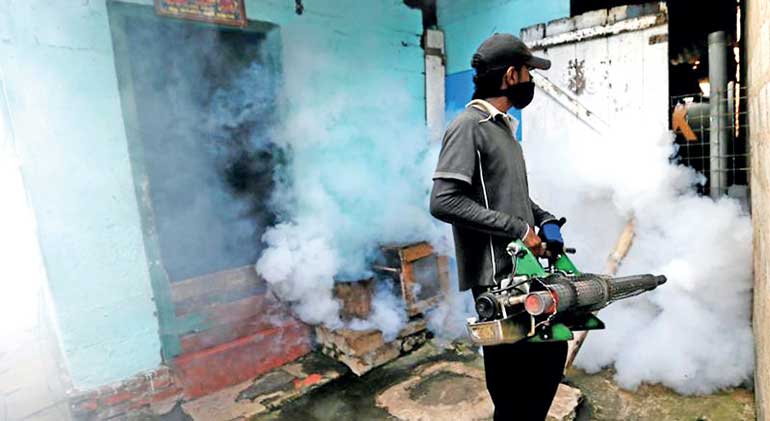Tuesday Feb 17, 2026
Tuesday Feb 17, 2026
Friday, 28 July 2017 00:00 - - {{hitsCtrl.values.hits}}
 Stressing on preventive measures, Ministry of Health and the World Health Organization yesterday said increased awareness and action by people to rapidly eliminate mosquito breeding sites and protect against mosquito bite, are key to arresting further spread of dengue in the island nation.
Stressing on preventive measures, Ministry of Health and the World Health Organization yesterday said increased awareness and action by people to rapidly eliminate mosquito breeding sites and protect against mosquito bite, are key to arresting further spread of dengue in the island nation.
“An intense and large scale response has been launched against dengue. Vector control campaigns are being scaled up and capacities of hospitals increased to detect and treat the affected people,” Director General Health Services, Dr J.M.W. Jayasundara Bandara said.
Detailing initiatives being taken as part of the emergency response to dengue, the Director General said efforts seek to reduce dengue cases by half in the next four to six weeks, which is possible only with full community support.
“A whole of society approach is needed to tackle dengue. Every individual needs to contribute to arrest dengue upswing. Protecting against mosquito bite, vector prevention and control, and timely medical care are currently the only effective measures against dengue,” World Health Organization Representative to Sri Lanka, Dr. Razia Pendse said here in a meeting with media persons.
There are no drugs yet to treat dengue. The treatment being provided seeks to address dengue symptoms and complications.
With climate change, more frequent and larger outbreaks of dengue are being experienced globally. This trend can, and must be arrested with enhanced vector control and personal protection practices, Dr. Pendse said.
Aedes mosquito, the vector for dengue, chikungunya and zika, bites throughout the day; its intensity is highest in early hours – after sunrise – and just before sunset.
Aedes mosquito lays eggs in stagnant water, in containers. Its eggs can survive up to one year, and grow into larvae as and when they come in contact with water, entomologists and experts explained in the meeting, stressing on the need to ensure that bottles, cups, coconut shells, tyre, cisterns and waste left in the open, in which water can accumulate, need to be discarded properly.
Overhead tanks, an important breeding ground for mosquitoes if left open, should be covered. The overflow pipe outlets of water tanks should have a net covering, to prevent mosquitoes from entering. Fountains, flower vases, pots, trays under refrigerators, etc should be emptied and cleaned at least once a week. If Aedes mosquito eggs are found in any water storage tanks in ground level, pots, etc, those surfaces should be scrubbed and cleaned.
In addition to vector control measures, people must prevent mosquito bites by wearing clothes that cover them well, use bed nets, screens on doors and windows, and mosquito repellents.
Those with dengue symptoms should seek and adhere to medical advice – whether they should stay home, rest, take paracetamol and plenty of fluids, or get admitted to a hospital.
To spread awareness among people on why they must, and how they can protect themselves against dengue and other vector borne diseases, experts from Ministry of Health, WHO and UNICEF, sought continued support of media.